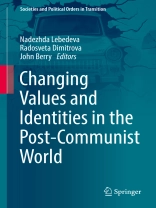This book offers a comparative analysis of value and identity changes in several post-Soviet countries. In light of the tremendous economic, social and political changes in former communist states, the authors compare the values, attitudes and identities of different generations and cultural groups. Based on extensive empirical data, using quantitative and qualitative methods to study complex social identities, this book examines how intergenerational value and identity changes are linked to socio-economic and political development. Topics include the rise of nationalist sentiments, identity formation of ethnic and religious groups and minorities, youth identity formation and intergenerational value conflicts.
Зміст
Introduction.- Democratic Values in the Post-Communist Region: The Incidence of Traditionalists, Skeptics, Democrats, and Radicals.- Emancipative Values in a Post-Communist Society – The Case of Serbia.- Changes in Value Structure among the Estonian Majority and the Russian-speaking Minority in Post-socialist Estonia.- Intergenerational Value Differences in Latvia and Azerbaijan.- The Values and Social Identity of Russian Muslims.- Intergenerational Transmission of Values in Urban and Rural Areas of Russia: the Role of Perceived Psychological Closeness.- Parenting Values and Practices across Post-Communist Societies in Youth Identity Formation: A literature Review.- Values of Ethnic Russian Minority Members in North Caucasus Republics of the Russian Federation: An Inter- and Intragenerational Comparison.- Values and Religious Identity of Russian Students from Different Religions.- Value Similarity with Mothers and Peers, and Family Climate as Predictors of Well-Being of Russian Youth in Latvia.- Generational Belonging and Historical Ruptures: Continuity and Discontinuity of Values and Attitudes in Post-Communist Romania.- Multiple Social Identities in Relation to Self-Esteem of Adolescents in Post-Communist Albania, Bulgaria, Czech Republic, Kosovo and Romania.- Probing the relationship between group identities of Russians and Ossetians in the Republic of North Ossetia-Alania: Intergenerational analysis.- Ethnic Identity and Cultural Value Orientations of Moldavian Youth in Transitional Society.- The Influence of Identity Styles on Adolescents Psychological Problems in Post- Communist Albania The Influence of Identity Styles on Adolescents Psychological Problems in Post- Communist Albania.- The Kaleidoscope of Language, Ethnicity, and Identity in Uzbekistan.- The Role of Social Disidentification in Acculturation Preferences of Ethnic Majority and Minority Members in Kabardino-Balkar Republic.- The Great Escape: Linking Youth Identity Development to Growing Up in Post-communist Romania.- Negotiating Identity and Belonging after Regime Change: Hungarian Society and Roma in Post-Communist Hungary.- Cultural Identification among Immigrants from the Former USSR: Insights from Comparative Research with Five Groups in Germany and Israel.- Value changes in adolescents’ anticipation of possible career selves in Slovenia and Serbia Identity and Work Ethic of Peasants in the Context of the Post-Soviet Socio-Economic Transformation.- Conclusion.
Про автора
Nadezhda Lebedeva is Professor in the Department of Psychology and Head of the International Laboratory for Socio-cultural Research at The National Research University Higher School of Economics in Moscow, Russia. She is Academic Director of double degree Master Program on Applied Social Psychology of HSE, Russia and Tilburg University, The Netherlands. Her research interests are values, identity, intercultural relations, acculturation, creativity and innovations, social and cultural change. She is the author of more than 200 articles and books in social and cross-cultural psychology.
Radosveta Dimitrova is Docent of Psychology at Stockholm University, Sweden. She holds Ph D in Developmental Psychology (University of Trieste, Italy awarded the 2009 Best Doctoral Thesis by the Italian Association of Psychologists), and a Ph D in Cross-Cultural Psychology (Tilburg University, the Netherlands, awarded the 2012 Student and Early Career Council Dissertation Award of the Society for Research in Child Development (SRCD). She is the winner of the 2016 Young Scientist Award of the International Society for the Study of Behavioral Development, ISSBD for distinguished theoretical contribution and programmatic research to the study of Behavioral Development and dissemination of developmental science. Her research interests regard migration, positive youth development, identity, intergroup relations, indigenous ethnic minority communities (Roma).
John Berry is Professor Emeritus of Psychology at Queen’s University, Canada, and Research Professor, National Research University Higher School of Economics, Moscow, Russia. He received Honorary Doctorates from the University of Athens, and Université de Geneve (in 2001).His interests are in cross-cultural and intercultural psychology, with an emphasis on applications to immigration, acculturation and multiculturalism. He has published over 30 books in the areas of cross-cultural, intercultural, social and cognitive psychology with various colleagues.












